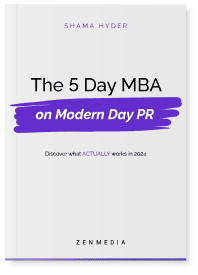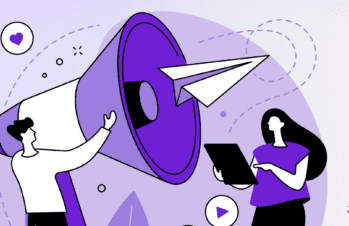“There’s no such thing as bad press” is an oft-used quote that doesn’t quite ring true when it comes to today’s buyers. While it’s often said with a tongue-in-cheek tone, corporate leaders are genuinely concerned about being “canceled” or becoming the next big and bad news story.
Our 24/7 news cycle, consumers’ general lack of trust, and changing cultural expectations have put immense pressure on organizations in recent years. In the B2B space, negative public perception is just one more concern to add to the top of an already-long laundry list of responsibilities related to brand perception—like concerns about quality, pricing, and competitor comparisons.
Marketing and PR firms do damage control, spend hours determining if specific messaging could result in a quick “cancel” of the brand, and focus on creating the most evergreen unoffensive messages possible. The expectation with these strategies is that the company will be presented to the world in the safest, most acceptable way — and this will help the brand win clients.
But it doesn’t really work that way.
Being the safest, most accessible brand won’t get customers in the door.
So, what’s the other option?
Instead of focusing all efforts on reducing negative perceptions and working to present a perfect and spotless brand image, B2B marketers should focus on brand awareness. After all, customers need to know who your brand is before they can determine if your brand is the best option for them.
Remember: the majority of the modern B2B buyer’s journey happens during the buyer’s independent research process. If they can’t find your brand online, you have a bigger problem than a negative review or heavy-handed messaging.
Lack of brand awareness hurts B2Bs more than negative perceptions can.
Related Reading: Negative Public Perceptions and Other PR Problems: How to Change the Narrative
What is brand awareness?
Brand awareness is the extent to which consumers can recognize a brand, its logo, messaging, etc.
Brand awareness is the extent to which consumers can recognize a brand, its logo, messaging, etc. Lack of brand awareness often sneaks up on companies—particularly startups—and it can have a big impact on your bottom line if not handled properly. Is it really possible that being unknown is worse than being thought negatively of? We’ll let you decide.
Here are our top three reasons that lack of brand awareness hurts B2Bs more than negative perceptions or comparisons ever could.
- Most B2B buyers don’t outright reject brands—especially those they haven’t purchased from yet.
In a study of U.K. banking buyers and U.S.A. business insurance buyers, only about 10% of buyers actively rejected a brand. This means that nine in 10 potential new B2B prospects will likely not hold any negative perception about your brand that could keep them from converting to a customer in the future.
This is great news for the opportunity to shape your brand’s public image. But remember, you need consumers to be aware of you before you can even attempt to influence their perception of you.
B2B brand Veolia Environmental Services, a waste management brand with operations in 35 countries, did just that. Veolia used a brand repositioning strategy to raise awareness of their work in the hazardous and non-hazardous waste removal industry but also to dispel the negative perception of their industry. Rather than be seen as a dirty job that pollutes, the brand wanted to show its B2B buyers (and the public) that it actually supports wildlife conservation and environmental causes with its work. But you don’t have to deal with hazardous waste to have buyers beware.
Reasons why B2B buyers may steer clear of a brand:
Size of the Company
Some buyers feel they need to work with a company of a certain size to keep up with the demands of the contract. It wouldn’t be a good business decision for a multinational company to sign a mom-and-pop shop to exclusively fulfill product parts.
Hyperlocal vs. Regional vs. National
Businesses may have preferences for how local or national their partners are based on how they can fulfill the needs of their business. For example, an artisanal craftsperson may favor a hyperlocal company when they need help setting up the POS for their new shop because they are proponents of supporting hyperlocal businesses. Likewise, another company may be looking to expand its horizons and needs a tech partner to help them scale up.
Brand History
Some brands have a long and sorted past. And even newer brands can slip up on Twitter and unwittingly become the latest “what not to do” meme on LinkedIn. If there is something in your company’s history—like supporting a controversial law or public figure or questions of ethical decisions—some B2B buyers may steer clear entirely.
But remember, this group only represents about 10% of your potential buyers. There is far more opportunity in pursuing the majority of buyers who may not know who you are yet. Even still, many of these negative perceptions can be mitigated or even reversed.
- Even when B2B buyers swear off a brand, the majority will consider buying the brand again in the future.
If having the majority of potential customers with a neutral (and some positive) view towards your brand isn’t enough, and you really want to raise your brand awareness while simultaneously changing the negative perception some buyers may have of your brand, then there’s good news for you. The majority of those consumers that actually have a negative perception of your brand are willing to purchase from you again in the future, despite their previous experience.
Don’t believe us? Remember when Chipotle exposed everyone to E.coli? Shortly after, the brand released a short video called “A Love Story” to remind everyone of their fresh ingredients. Later, it launched a loyalty program and the “For Real” campaign once again emphasizing Chipotle’s real, easy-to-recognize ingredients. While the company saw a stock drop for the first three years after the E.coli outbreak, it is back and doing better than ever.
This is why strategic PR and marketing—with a focus on brand awareness—are such critical components of B2B brand success. The more positive and engaging interactions a prospect has with your brand, the more likely the good will outweigh the bad, and they’ll give you another shot. It’s simple math. It may take time to overcome a negative perception, but eventually, the positive interactions will outweigh the negative.
Strategic public relations can boost brand credibility by positioning your company as one of the best on reputable websites and in well-respected publications. Consistent marketing tactics across platforms demonstrate that the brand is here to stay and is continuing to deliver value for customers.
The goal of B2B marketing is not to change the minds of your customers but to be on the minds of customers. Being bold in the way you build your brand will ultimately be more effective in winning customers than playing it safe and staying under the radar.
Related Reading: Crisis Communication 101 for B2Bs
- Statistically, more people don’t know your brand than dislike your brand—and that’s true for companies big and small.
In The B2B Institute’s study, researchers found that even the most well-known B2B brands had more potential customers unaware of the brand than actively disliking and negatively perceiving it. Researchers identified that lack of brand awareness is a four to eight times larger problem than brand rejection—especially for smaller B2B brands.
You need brand awareness before you amplify.
So ultimately, yes, negative perceptions can hurt your brand if they are overwhelming and constant, but that isn’t the case for most B2Bs. The larger barrier to success for B2Bs is a lack of brand awareness. Building a rapport with an audience and creating relationships is important, but if you are missing whole segments of your potential market simply because they don’t know you exist, then you are wasting resources and narrowing your funnel far too early.
Related Reading: What is a Relationship Marketing? And Why Should Every B2B Brand Invest in it?
Want help raising awareness for your brand? We’ve got you covered. Let’s chat.







